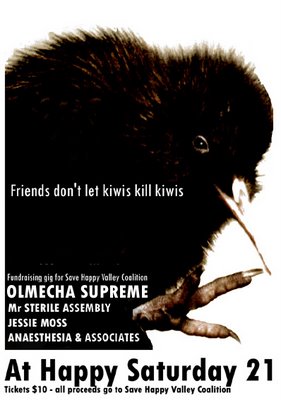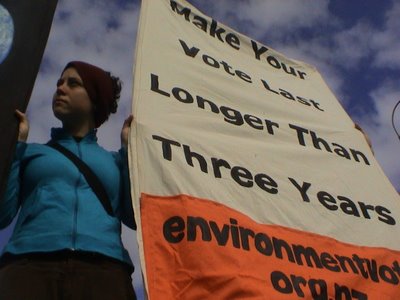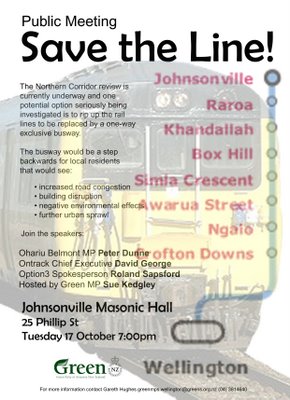Monday, October 30, 2006
Seamounties say "Canada protect sea mounts!"
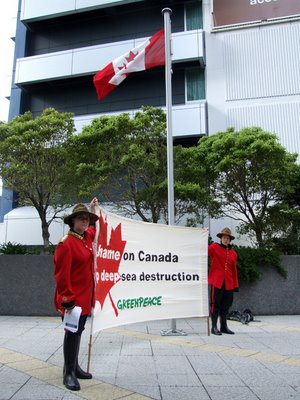
Wellington, Today the Canadian High Commission got a timely reminder of Canada's necessity to learn lessons from the past and stop undermining a global moratorium on bottom trawling in international waters at the UN.
Two protesters dressed as Canadian Mounties – in this case, Sea Mounties – were joined by other Greenpeace activists handing out leaflets to Canadian High Commission staff this morning alongside a banner reading "Shame on Canada - Stop deep-sea destruction".
Greenpeace NZ delivered a letter from Greenpeace New Zealand and Environment and Conservation Organisations of New Zealand (ECO) to Canada's High Commissioner addressed to Canadian Prime Minister, Stephen Harper, which urged him to reconsider his country's opposition to a moratorium on bottom trawling in international waters.
Canada's once-abundant cod and New Zealand's orange roughy have been all but wiped out in the world's biggest fisheries disasters of modern times.
"In both cases, these fish populations have been decimated by bottom trawlers that also bulldoze their ancient habitats. Bottom trawling is like destroying paddocks in order to harvest sheep – no farmer would be that crazy," says Greenpeace political advisor Geoff Keey.
"We all need to learn from these disasters and act quickly to protect the incredible life in the deep sea. That's why it is particularly upsetting to see the Canadian Government – that should know better - undermining progress on a UN moratorium on bottom trawling in international waters".
"The science is clear, the first hand accounts and photos all back up the nasty impacts of bottom trawling. It's time for Canada to show the kind of leadership our oceans need," said Keey.
The UN meets next month to negotiate over ways to stop the destruction of deep-sea life in international waters caused by bottom trawlers – including moratorium on the practice.
Industrial bottom trawling, or 'dragging' as the Canadians call it, had become the dominant fishing practice after WWII in the centuries-old cod fishery off eastern Canada. By 1992, the cod stocks were devastated, the fishery collapsed and more than forty thousand people were thrown out of work.
"We need to see leadership from Canada, not blind repetition of past mistakes ," concluded Keey.

Thursday, October 26, 2006
The world's craby that Canadia won't join move to bottom trawling moratorium

www.deepseas.blogspot.com is a great website with heaps of images of Canadians personal messages to their Government on bottom trawling.
This is my favourite. Here's a great photo of Heather McKibbon doing a crab dance in Dartmouth yesterday, drawing attention to the fact that dragging in the high seas results in the destruction of habitat for a variety of marine creatures.
This website also pictured our banner outside New Zealand's Parliament (at the bottom of the page)
Youth Rates Suck!
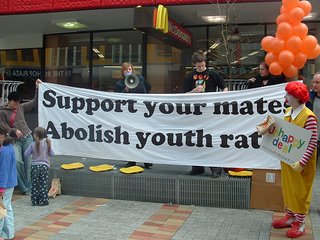
Yesterdays rally at Manners Mall in
Around 50 people gathered outside the McDonalds restaurant, a target of the campaign because unlike other business such as Restaurant Brands (Pizza Hutt and KFC) or BP Oil, McDonalds continues to pay discriminatory youth rates: where under 18 year olds only receive 80% of the adult minimum wage.
The campaigners unfurled a large banner reading “Support your mates – abolish youth rates!” and an a activist dressed as Ronald McDonald handed out ‘unhappy meals’ – activist packs containing a stickers, leaflets and campaign information and a lollipop with ‘Youth Rates Suck!’ on it.
Green MP Sue Bradford, the MP responsible for the Bill attempting to abolish youth rates in Parliament took time a way from the house and spoke at the rally, encouraging young people to take action on this campaign.
Despite a lower than hoped for turn-out the organisers felt the rally was a success that got the message out loudly and are committed to organising further actions in the future.

more info on campaign
more photos
Monday, October 23, 2006
Save Happy Valley at Happy

Save Happy Valley Wellingtons fundraisin’g gig on Saturday night went off. We had around 70 people show up which means we made roughly $600 in profit. First up Jessie Moss, from Harriet and Matches got the gig going with her smooth solo acoustic sounds, followed by slightly louder and more frantic Mr Sterile Assembly who led-up to a fever pitch performance by punk-rock Anaesthesia Associates. Olmecha Supreme headlined the gig and got everyone out of their seats and on to the dance floor with their wicked performance. Gareth got up and said a few words about the campaign and our activities and invited everyone to get down to the Valley this summer. By all measures the gig was a total success and big thanks has to go to Happy for hosting the event, the bands for donating their time, and a special thanks to Rusty for organising the event.
Wednesday, October 18, 2006
Greens, United Future and Labour join forces to save Johnsonville Line
The thrust of the meeting was opposing the busway and the audience heard from all the speakers many different and varied reasons why. Peter Dunne provided some historical context saying that this was his 3rd or 4th time he has been involved in saving this piece of track.
Green Party Press Release:
Green Party Associate Transport Spokesperson Sue Kedgley is to host a public meeting tomorrow evening to oppose the discontinuation of the Johnsonville rail line.
United Future Leader Peter Dunne, Ontrack Chief executive David George, and Option3 Spokesperson Roland Sapsford will speak at the event.
A review of options for the line is currently underway, and one option being considered by the Greater Wellington Regional Council is to rip up the railway tracks and replace them with a one-way exclusive busway.
"Ripping up an existing, electrified rail line and replacing it with diesel buses is a loopy idea and would constitute a giant step backwards for local residents," Ms Kedgley says.
"Buses are less popular than trains, carry far fewer passengers, already cause congestion in Wellington traffic, and are reliant on fossil fuels which fluctuate in price and produce harmful greenhouse gas emissions.
"Opposition to this scheme is widespread, and transcends party-political lines. Hopefully the Regional Councillors will recognise the folly of this proposal, and direct their attentions instead to upgrading and improving the service on the existing Johnsonville line."
Listen to the national radio storyMonday, October 16, 2006


Next movie this Friday (Oct 20)
At the Green Rooms cnr Courtney Place and Cambridge Tce.
 "GE trees have the potential to wreak ecological havoc throughout the world's native forests. GE Trees could also impact wildlife as well as rural and indigenous communities that depend on intact forests for their food, shelter, water, livelihood and cultural practices. As a geneticist, I believe there are far too many unknown and unanswered questions to be growing genetically engineered plants— food crops or trees—in open fields. GE trees should not be released into the environment in commercial plantations and any outdoor test plots or existing plantations should be removed."
"GE trees have the potential to wreak ecological havoc throughout the world's native forests. GE Trees could also impact wildlife as well as rural and indigenous communities that depend on intact forests for their food, shelter, water, livelihood and cultural practices. As a geneticist, I believe there are far too many unknown and unanswered questions to be growing genetically engineered plants— food crops or trees—in open fields. GE trees should not be released into the environment in commercial plantations and any outdoor test plots or existing plantations should be removed." Sunday, October 15, 2006
Meghan
Thursday, October 12, 2006
Monday, October 09, 2006
A dozen reasons to say 'no way!' to the busway:
- Cost. It is considerably cheaper to upgrade a rail line than it is to install a guided busway
- Construction delays: this could take 2 years or longer to build causing massive disruption.
- Undirectionality. The busway operation would be one way requiring confusing am/pm timetables.
- Congestion. The busway would significantly increase congestion through more buses on the roads and would see traffic problems at:
- Where the busway joins normal road traffic somewhere near the entrance to the Ngaio Gorge.
- Lambton Quay where there already is considerable bus congestion. It is unlikely that 35 extra buses could be accommodated.
- Environmental and sustainability issues:
- Use of diesel fuel which contributes to local pollution and climate change.
- Security of diesel supply and cost uncertain
- Diesel buses produce noise pollution
- Increased traffic congestion especially on Lambton Quay.
- Less capacity. Over-all passenger capacity of busway would be less than current rail roughly one third.
- Less popular. Buses are less popular than trains .
- Less efficient. Trains are more efficient than buses in terms of rubber-to-concrete vs. steel-to-steel contact.
- Encourage sprawl. The busway would limit ‘transport orientated development,’ stimulating urban sprawl.
- High Upfront costs. Capital expenditure can be phased over time for rail option but not so for the busway option.
- Keeps commuters on congested roads. Rail is more likely to achieve a modal shift from cars to public transport than buses are.
- Ontrack. The Crown through Ontrack owns the tracks and the have said:
- They would have to approve the ripping up of the tracks, and:
- They would be unlikely to, in light of the National Rail Strategy.
- ‘It would be a big ask to simply hand over,’ the considerable infrastructure of tunnels, bridges, overhead line etc.

